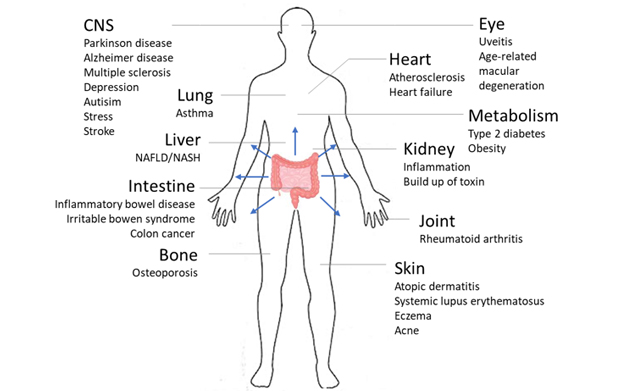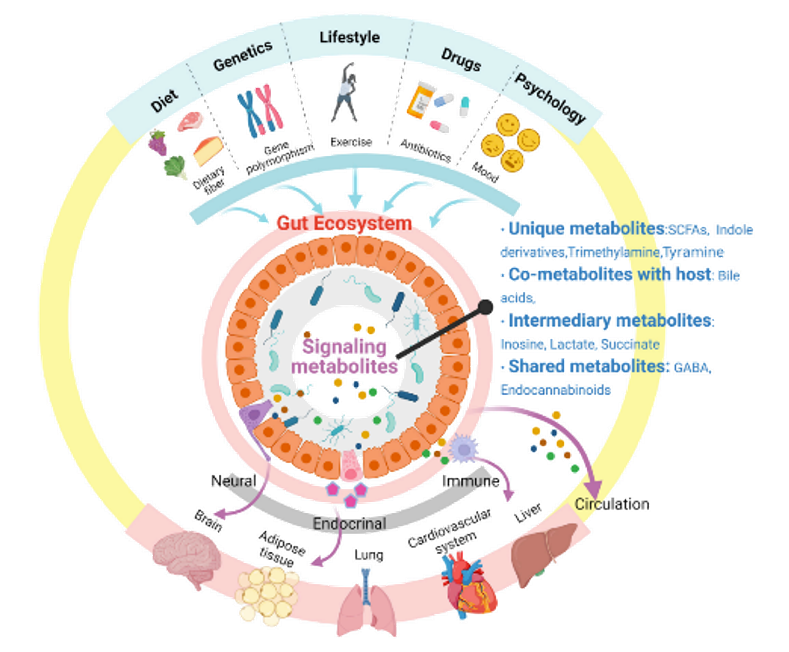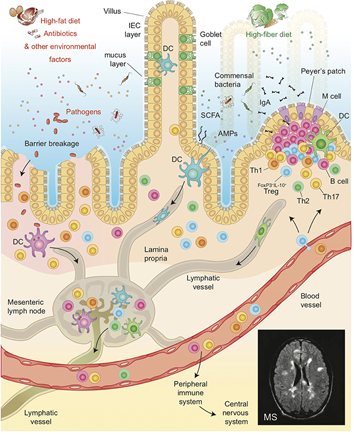An increasing amount of scientific research is connecting the gut with overall human health and disease. The gut microbiota can influence gut and other organs’ physiology and functions through modulating metabolism, endocrine, immunology and neural circuits. CommBio Tx combines and leverages synthetic biology tools with intestine biology and disease biology knowledge, to design and construct live biotherapeutic medicines programmed with specific genetic components that can modulate specific disease pathways. When these “live synthetic biotherapeutics” reach the human gut, they can be programed to perform a range of functions, including metabolizing harmful substances or secreting bioactive molecules to precisely modulate disease-related pathways, and thus treat respective diseases. After completing their duties, these bacteria will be excreted by the human body and become inactive, so they will not incur any unwanted influence in the human body or the environment.












While there remains much to learn about the origin and progression of chronic diseases, there is growing certainty of the influence, site of influence and mechanisms of actions by which the microbiota can modulate different and diverse disease states. It follows that live bacterial gene therapy offers a completely novel set of tools for exploring ways to modulate these disease states that are less accessible for established drug platforms and more precise than trying to harness or replicate the variable and naturally occurring bacterial communities that act in concert to modulate these pathways and influence disease phenotypes. Using a genetic engineering approach we can create a single well characterized live bacterial product that is “drug-like” in its development and application, to modulate disease from the gut to impact on metabolic, endocrine, immune and neural pathways. The platform is easily built upon to incorporate new insights in disease biology by adding new payloads for example or regulatory elements and thus providing a basis for long term product development and market leadership that ultimately benefits patients.
Many diseases, especially the chronic ones, have highly complicated development mechanisms. Existing therapeutic modalities often struggle in these areas. Scientific advances in intestine biology have provided us with a new promising angle to understand and treat these complicated diseases. Using genetically engineered microbiome, we are able to precisely modulate disease signals within the gastrointestinal system, including gut metabolic, endocrine, immune and neural functions, and treat related diseases. This novel modality also has unique advantages in multiple aspects in comparison to traditional therapeutic approaches, including safety and efficacy.

Bacteria strains’ therapeutic functions were rationally designed and engineered based on scientific knowledge, they have precise targets and clear MOA

Non-pathogenic probiotic bacteria strain used as chassis; Engineered bacteria delivered into gastrointestinal region and perform therapeutic functions locally

Bacterial chassis can carry multiple genes and modulate multiple disease signals simultaneously, thus achieving potentially better efficacy against complex chronic diseases

Engineered bacteria’s manufacturing process is more straight forward, standardized and less costly in comparison to other biological products / gene therapies.
Genetically engineered microbiome is a novel therapeutic approach with potential to revolutionize the treatments for many diseases. Rapid advances in intestine biology and gene editing technology in the last decade provided a solid foundation for this modality’s development. As of today, scientists have already discovered that the gut system and functions can directly modulate human diseases. Aside from diseases of the gastrointestinal system itself, the gut can also directly drive or influence disease occurrence and progression in other organs for example through bacterial metabolite release, immune or neural or endocrine receptor stimulation, or immune cells relocation. These important links between the gut and different organ systems serve as the basis for genetically engineered bacterial therapeutics.



Gut microbiota can modulate intestine epithelial cells, immune cells and even distant organ tissue cells through their metabolites, such as SCFA and bile acid.
 Zheng, X. et al. Emerging targetome and signalome landscape of gut microbial metabolites. Cell Metabolism, 2022, 34(1), pp.35–58.
Zheng, X. et al. Emerging targetome and signalome landscape of gut microbial metabolites. Cell Metabolism, 2022, 34(1), pp.35–58.
Gut immune cells or immune factors can influence immune system of the brain and other organs through the gut nerve and circulation system.
 Antonini et al. How the Interplay Between the Commensal Microbiota, Gut Barrier Integrity, and Mucosal Immunity Regulates Brain Autoimmunity. Frontiers in Immunology, 2019
Antonini et al. How the Interplay Between the Commensal Microbiota, Gut Barrier Integrity, and Mucosal Immunity Regulates Brain Autoimmunity. Frontiers in Immunology, 2019

Emerging strategies for engineering Escherichia coli Nissle 1917-based therapeutics, Trends in Pharmacological Sciences, 2022
Developing a new class of engineered live bacterial therapeutics to treat human diseases, Nature Communications, 2020
Emerging strategies for engineering Escherichia coli Nissle 1917-based therapeutics, Trends in Pharmacological Sciences, 2022
Emerging strategies for engineering Escherichia coli Nissle 1917-based therapeutics, Trends in Pharmacological Sciences, 2022
Developing a new class of engineered live bacterial therapeutics to treat human diseases, Nature Communications, 2020
Emerging strategies for engineering Escherichia coli Nissle 1917-based therapeutics, Trends in Pharmacological Sciences, 2022
Emerging strategies for engineering Escherichia coli Nissle 1917-based therapeutics, Trends in Pharmacological Sciences, 2022
CommBio Therapeutics Co., Ltd 沪ICP备2021004953号-1